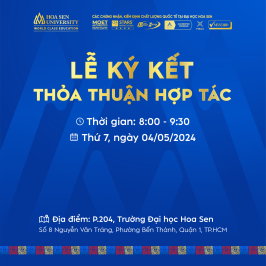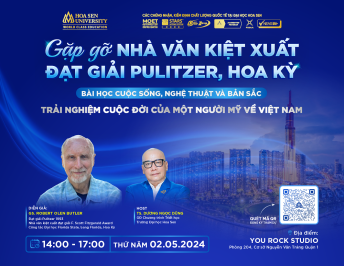Hoa Sen Research Seminar # 104
In the first session (9:00-10:30), Mr. Le Minh Thanh, the Head of Hospitality Department at Hoa Sen University, will present his research on “Building Trust on the online review site of Trip Advisor: the cases of top ranked hotels in Ho Chi Minh city, Vietnam”. For those who are interested in “building trust” issues and the use of social media to improve management practices, you will find this research very interesting.
Abstract:
Online guest reviews are becoming a powerful source of information affecting online hotel booking decision. The guest reviews affect hoteliers’ implementation of appropriate managerial tasks to enhance their hotel guest satisfaction; to improve staff morale with an ultimate aim to meet their owner satisfaction by increasing potential bookings or increasing revenue. Using a framework of organizational learning process, this study focuses on exploring online reviews in the co-creation of the guest service experience at the upscale hotels in Ho Chi Minh city, Vietnam. The content analysis methodology has been deployed to examine the task experiences of hotel managers and senior staff in creating knowledge about trust in the special context setting of social media via the world’s largest travel site TripAdvisor®. The proper organizational learning process is an ongoing process to convert managerial tasks into favorable knowledge about customer’s trust that affects their online hotel booking decisions (Argote and Miron-Spektor, 2011). In this study, three main constructs about customer’s trust in e-commerce are explored in parallel with the best management practices: trust in the competence, trust in the reliability, and trust in the goodwill of the service suppliers (Ratnasingam, 2012).
Research design has two main flows of the descriptive exploration. At first, the secondary data in the form of published online guest reviews have been coded based on the three main constructs of customer’s trust with support of the NVivo10 software for content analysis. The second flow of insights has come from shared live experiences of in-depth interviews with hotel managers and senior staff in an effort to understand their best interaction practices in mastering three types of trust in responding to the satisfaction of their hotel customers. The findings highlight the importance of managing expectations from all the involved stakeholders’ right at a time with involvement of service staff, guests as well as hotel owner, and the ways to bring highest values for them.
It is our pleasure to have Dr. Le Cong Tru, Director of Center for International Education, Nong Lam University, at HSRS. Dr. Tru is an active researcher and has a lot of experience in doing research in Vietnam. In the second part of HSRS#104, he will present his research on “Shrimp Cultivation As An Adaption Measure To Salinity Intrusion In The Tien Giang And Bentre Provinces, Mekong Delta, Vietnam“.
Abstract:
Impacts of salinity intrusion are assessed and adaptation options identified, special adaptation in agriculture to salinity intrusion is important. This study introduces factors affecting farmers’ intention and behavior in the Mekong Delta when they applied shrimp cultivating measure. Research model bases on The Theory of Planned Behavior (TPB) and Structural Equation Model (SEM) technique. Result shows that the impacts of attitude toward the behavior (0.341), perceived behavioral control (-0.216) and income (0.155) on intention are statistically significantly. On the other hand, actual behavioral control (-0.373), and perceived behavioral control (0.463) are significant impact on behavior (B).






